Related Research Articles
The Fatback Band is an American funk and disco band that was popular in the 1970s and 1980s. The Fatback Band is most known for their R&B hits: "(Do the) Spanish Hustle", "I Like Girls", "Gotta Get My Hands on Some (Money)", "Backstrokin'" and "I Found Lovin'".

"That'll Be the Day" is a song written by Buddy Holly and Jerry Allison. It was first recorded by Buddy Holly and the Three Tunes in 1956 and was re-recorded in 1957 by Holly and his new band, the Crickets. The 1957 recording achieved widespread success. Holly's producer, Norman Petty, was credited as a co-writer, although he did not contribute to the composition.

"Skin Trade" is a song by the English pop rock band Duran Duran, released in January 1987 as the second single from their fourth studio album, Notorious (1986). It showcased a drastic change from their previous singles, with R&B influences, brass solos and funk guitar riffs, in addition to a Prince-style falsetto from lead vocalist Simon Le Bon.

Porter Wayne and Dolly Rebecca is the fourth collaborative studio album by Porter Wagoner and Dolly Parton. It was released on March 9, 1970, by RCA Victor. The album was produced by Bob Ferguson. It peaked at number four on the Billboard Top Country Albums chart and number 137 on the Billboard 200 chart. Two top ten singles were released from the album, "Just Someone I Used to Know" and "Tomorrow Is Forever", peaking at numbers five and nine, respectively. "Just Someone I Used to Know" was nominated for Best Country Performance by a Duo or Group at the 12th Annual Grammy Awards.
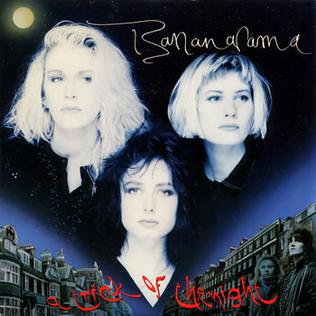
"A Trick of the Night" is a mid-tempo ballad recorded by English girl group Bananarama. It was written and produced by Steve Jolley and Tony Swain and released as the final single from Bananarama's album True Confessions.
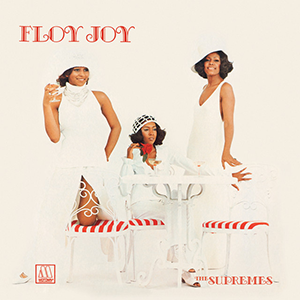
Floy Joy is the twenty-fifth studio album released by The Supremes on the Motown label. This was the only Supremes album solely produced and arranged by Smokey Robinson and included the U.S. top 20 hit, "Floy Joy" and the U.S. top 40 hit, "Automatically Sunshine", both of which were top 10 hits in the U.K.

Matt Bianco was the second album by the British band Matt Bianco, released in 1986 for WEA. For this album, the band's line-up comprised vocalist Mark Reilly and musician Mark Fisher. Jenni Evans sings backing vocals on nearly every track, but was not listed as an official band member.
World is the second studio album by Northern Irish synthpop / dance band D:Ream, released in 1995. It was to be the band's final studio release before their disbanding in 1997, and their re-forming in the late 2000s.

Mountain Music is the sixth studio album by American country music group Alabama, released in 1982. A crossover success, it ranked well as an album on both country and pop charts and launched singles that were successful in several markets. This is Alabama's most successful studio album. In 1998, the album was certified 5× Platinum by the Recording Industry Association of America. It peaked at No. 1 on the Billboard Country Albums chart and No.14 on the Billboard 200.
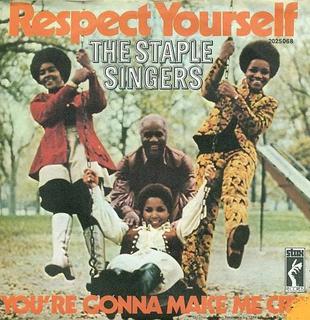
"Respect Yourself" is a song by American R&B/gospel group the Staple Singers. Released in late 1971 from their album Be Altitude: Respect Yourself, the song became a crossover hit. The Staple Singers' version peaked at No. 12 on the Hot 100, No. 2 on the Hot Soul Singles chart, and is one of the group's most recognizable hits. In 2002, the song was inducted into the Grammy Hall of Fame, and in 2010 it was ranked #468 on the Rolling Stone list of the 500 Greatest Songs of All Time, moving down 4 spots from #464 in 2004.
Bang was a Greek male vocal duo, consisting of Paul Stevens and Billy Adams (keyboards). They had chart success with the single "You're the One", released on the RCA label. It entered the UK Singles Chart on 6 May 1989, reaching #74. It was in the chart for two weeks. The B-side of the 7" version was "Don't Burn Down the Bridge", with the 12" having an additional instrumental version.

"Give Me the Night" is a song recorded by American jazz and R&B musician George Benson, which he released from his 1980 studio album of the same title. It was written by Heatwave's keyboard player Rod Temperton and produced by Quincy Jones. Patti Austin provides the backing and scat vocals that are heard throughout, and one of Benson's fellow jazz guitarists, Lee Ritenour, also performs on the track.
"Love X Love" is a song written by Heatwave's keyboard player Rod Temperton and recorded by American guitarist and singer George Benson. Featured on Benson's Give Me the Night album, it was also released as a single. In Britain, it entered the UK Singles Chart on 26 July 1980 and reached a peak position of number 10, remaining in the chart for eight weeks. In the US "Love X Love" made the Hot 100 and was a Top 10 soul hit.
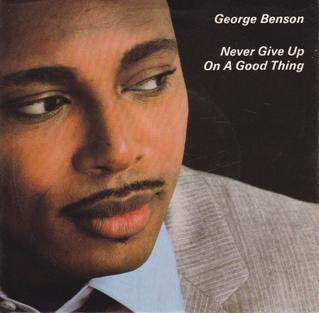
"Never Give Up on a Good Thing" is a song by American R&B singer George Benson, released as a single in December 1981. It entered the UK Singles Chart on 23 January 1982, and reached a peak position of number 14. It remained on the chart for 10 weeks.

"Lady Love Me (One More Time)" is a single recorded and released by George Benson. It was written by David Paich and James Newton Howard, both of whom were associated with rock band Toto, Paich being a member and Howard a frequent collaborator. The song was produced by Arif Mardin. While the single was moderately successful in the United States, charting at No. 30 on the Billboard Hot 100, No. 21 on the Soul singles chart and No. 4 on the Adult Contemporary chart, it was markedly more successful in the United Kingdom. The single entered the UK Singles Chart on 21 May 1983. It reached a peak position of number 11, and remained in the chart for 10 weeks.

The Mission are an English gothic rock band formed in 1986. Initially known as the Sisterhood, the band was started by frontman Wayne Hussey and bassist Craig Adams, soon adding drummer Mick Brown and guitarist Simon Hinkler. Aside from Hussey, the lineup has changed several times during the years and the band has been on hiatus twice.
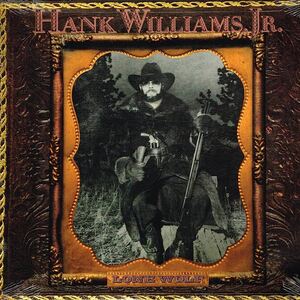
Lone Wolf is the forty-second studio album by American musician Hank Williams Jr. It was released by Warner Bros./Curb Records in January 1990. "Ain't Nobody's Business," "Good Friends, Good Whiskey, Good Lovin'" and "Man to Man" were released as singles. The album peaked at number 2 on the Billboard Top Country Albums chart and has been certified Gold by the RIAA.
"Looking Good Diving" is a 1987 song performed by Morgan-McVey, who were vocalists Jamie Morgan and Cameron McVey. It was their only single. The track was released through Sony Records in 1987, and was produced by Stock Aitken Waterman (SAW) and mixed by Phil Harding. The track's B-side, "Looking Good Diving with the Wild Bunch", featured Neneh Cherry on vocals, and was a tribute to the 'buffalo stance', a type of pose.

Twice the Love is a 1988 studio album by American guitarist and singer George Benson that was recorded with six production teams. The two main singles off the record were the title track "Twice the Love" and the Curtis Mayfield song "Let's Do It Again" which was a No. 1 hit for The Staple Singers in 1975.

While the City Sleeps... is a 1986 studio album by American guitarist and singer George Benson, released on Warner Bros. Records. It features musicians like Paulinho da Costa, Preston Glass, Paul Jackson, Jr., Marcus Miller and Narada Michael Walden, alongside young talents of the time like Kenny G, Randy Jackson and Kashif. Although it does not have any instrumental tracks, Benson's guitar playing is somewhat in the headlight in songs like "Love Is Here Tonight", "Teaser" and "Too Many Times". The most successful single of the album, "Kisses in the Moonlight", is still frequently played by Benson at live performances and is present on many of his compilation albums On the B-side of the "Kisses in the Moonlight" single – alongside "Breezin'" on the 12" version – is the instrumental song "Open Your Eyes" which is not available elsewhere.
References
- ↑ Rice, Tim; Rice, Jonathan; Gambaccini, Paul (1990), Guinness Book of British Hit Singles & Albums , Enfield, Middlesex: Guinness World Records and Guinness Publishing, ISBN 0-85112-398-8
- ↑ Hussey, Wayne (28 January – 10 February 1987). "Singles reviewed by Wayne Hussey" (PDF). Smash Hits . Vol. 9, no. 2. p. 49. ISSN 0260-3004 . Retrieved 20 November 2023– via World Radio History.